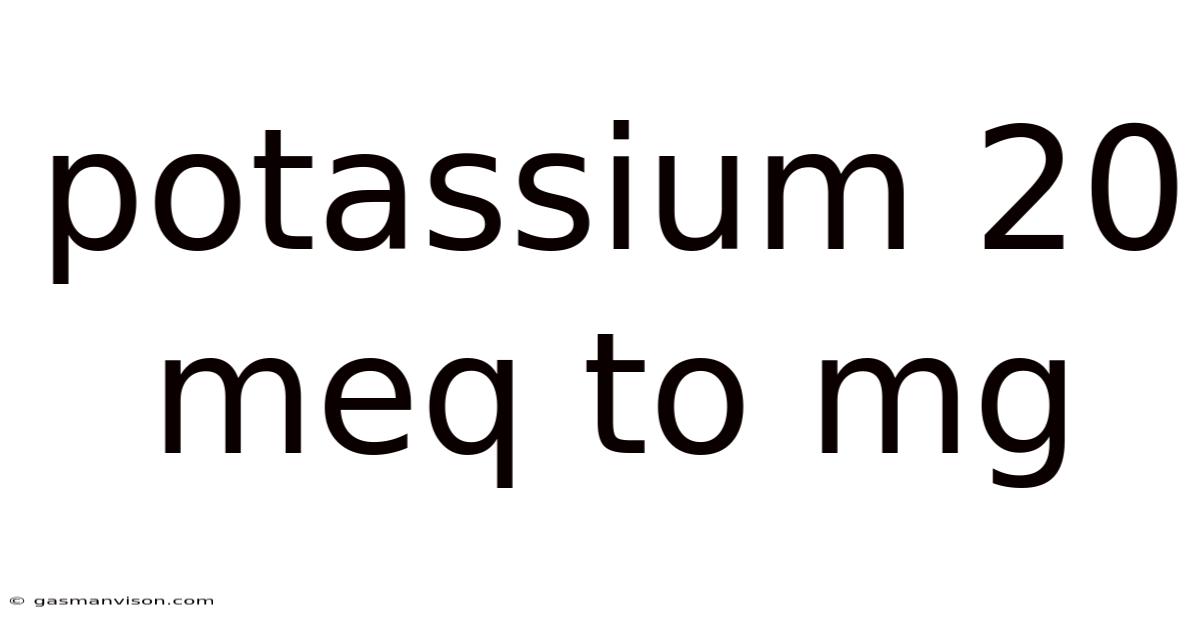Potassium 20 Meq To Mg
gasmanvison
Sep 11, 2025 · 4 min read

Table of Contents
Deciphering the Conversion: 20 mEq Potassium to mg and its Clinical Significance
Understanding the conversion of potassium from milliequivalents (mEq) to milligrams (mg) is crucial in various medical and scientific fields. This article delves deep into this conversion, explaining the underlying principles, providing a detailed calculation, and exploring its significance in clinical settings, particularly concerning electrolyte balance and patient health. We'll also touch upon related topics such as potassium's role in the body, potential risks of imbalances, and the importance of accurate measurement and monitoring.
What is Potassium and Why is it Important?
Potassium (K) is an essential electrolyte, meaning it carries an electrical charge when dissolved in body fluids. It plays a vital role in numerous bodily functions, including:
- Maintaining fluid balance: Potassium helps regulate the amount of water inside and outside your cells.
- Muscle contractions: It's essential for the proper functioning of muscles, including your heart.
- Nerve impulses: Potassium facilitates the transmission of nerve signals throughout the body.
- Blood pressure regulation: It helps maintain healthy blood pressure levels.
- Enzyme activation: Many crucial enzyme reactions require potassium for optimal function.
Understanding Milliequivalents (mEq) and Milligrams (mg)
Before tackling the conversion, it's crucial to understand the difference between mEq and mg:
- Milligrams (mg): This is a measure of weight or mass. It indicates the amount of potassium present in a sample.
- Milliequivalents (mEq): This is a measure of chemical activity or combining power. It considers both the weight of potassium and its electrical charge. One mEq of potassium represents the amount of potassium that carries one thousandth of a mole of positive charge.
This difference is vital because the biological effects of potassium depend not only on its amount but also on its ability to carry an electrical charge.
Converting 20 mEq Potassium to mg: The Calculation
The conversion of mEq to mg for potassium involves using its atomic weight and valence. Potassium has an atomic weight of approximately 39.1 grams per mole and a valence of +1 (meaning it carries one positive charge).
Here's the step-by-step calculation:
-
Convert mEq to moles: 1 mEq of potassium is equal to 0.001 moles. Therefore, 20 mEq is equivalent to 20 * 0.001 = 0.02 moles.
-
Calculate the weight in grams: Using the atomic weight of potassium (39.1 g/mol), we find the weight in grams: 0.02 moles * 39.1 g/mol = 0.782 grams.
-
Convert grams to milligrams: There are 1000 milligrams in 1 gram. Therefore, 0.782 grams * 1000 mg/g = 782 mg.
Therefore, 20 mEq of potassium is approximately equal to 782 mg.
Important Considerations:
- Rounding: The calculation above uses approximate atomic weight. Slight variations may occur depending on the precision of the atomic weight used.
- Context is Key: The conversion is straightforward, but the clinical interpretation depends heavily on the context. A potassium level of 782 mg in a single dose of supplement is different from a serum potassium level of 782 mg/dL (milligrams per deciliter of blood). The latter would be dangerously high. Always consider the unit of measurement and the biological context.
Clinical Significance of Potassium Levels
Maintaining appropriate potassium levels is critical for health. Both hypokalemia (low potassium) and hyperkalemia (high potassium) can have severe consequences.
Hypokalemia (Low Potassium): Symptoms can range from mild muscle weakness and fatigue to life-threatening cardiac arrhythmias. Causes include diuretic use, vomiting, diarrhea, and certain kidney diseases.
Hyperkalemia (High Potassium): This condition can also lead to potentially fatal cardiac arrhythmias. Causes include kidney failure, certain medications, and excessive potassium intake.
Accurate Measurement and Monitoring
Precise measurement and monitoring of potassium levels are essential in clinical settings. Blood tests are routinely used to determine serum potassium concentration. These levels are usually expressed in mEq/L (milliequivalents per liter) or mmol/L (millimoles per liter). Understanding the conversion between mEq and mg is therefore crucial for accurate interpretation of lab results.
Potassium Supplementation and Dietary Intake
Potassium is readily available in many foods, including bananas, potatoes, spinach, and tomatoes. However, individuals with certain medical conditions might require potassium supplementation. Always consult a healthcare professional before starting any potassium supplements, as excessive intake can be harmful.
Understanding the Role of Other Electrolytes
Electrolytes like sodium, calcium, and magnesium interact with potassium to maintain overall fluid and electrical balance. Any imbalance in one electrolyte can affect the others, making a holistic approach to electrolyte management crucial.
Conclusion: The Importance of Accurate Potassium Management
The conversion from 20 mEq potassium to approximately 782 mg, while seemingly a simple calculation, highlights the importance of understanding the different units of measurement and their clinical relevance. Accurate potassium management is vital for maintaining overall health and preventing life-threatening complications. This requires a comprehensive understanding of potassium's role in the body, potential risks associated with imbalances, and the significance of accurate measurement and monitoring. Always consult with a healthcare professional for advice on potassium intake and management, especially if you have any underlying medical conditions or are taking medications that can affect potassium levels. This article serves as an educational resource and should not be considered medical advice.
Latest Posts
Latest Posts
-
4 7 As A Decimal
Sep 12, 2025
-
What Equals 24 In Multiplication
Sep 12, 2025
-
20 Degrees Celsius To Kelvin
Sep 12, 2025
-
What Is 20 3 Whole Number
Sep 12, 2025
-
Line Representing Rise And Run
Sep 12, 2025
Related Post
Thank you for visiting our website which covers about Potassium 20 Meq To Mg . We hope the information provided has been useful to you. Feel free to contact us if you have any questions or need further assistance. See you next time and don't miss to bookmark.